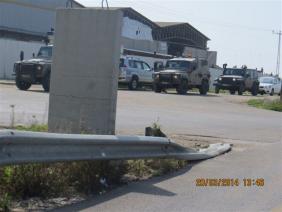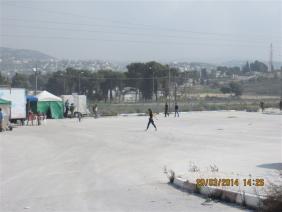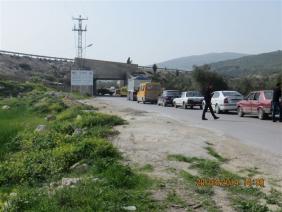'Azzun 'Atma, Habla, Huwwara, Kifl Harith, Za'tara (Tapuah)
Flying Checkpoints – turns out they are rather permanent despite their name – at the entrance to Burin village, under the bridge connecting Burin and Madama, and between the villages of Madama and Asira al Qibliya.
13:40 – Habla Checkpoint
Few passers at this time. Later, the gate will only be opened for a single hour in the evening.
13:50 Army jeeps park at the entrance to the village of Izbat Tabeeb (first photo).

Inside, the village is quiet. At Funduq villge we were told of a flying checkpoint at Jit junction. When we passed there, the checkpoint was no longer up.
On road 60, looking down beneath the bridge between the villages of Burin and Madama, we see a line of detained vehicles, but decided to go to Huwwara checkpoint first, and then come back. So far we hardly saw army vehicles in motion, but now, near the junction of Burin and Huwwara, many army vehicles travel in all directions. Right then, an army vehicle stands as an ‘observation parking point’ at the northern entrance to Huwwara village. In the past, Palestinian vehicles were also inspected there.
14:25 Huwwara Checkpoint – at the hitchhikers post on the way to Beracha settlement, a soldier stands guard. So, too, inside the watchtower facing the hitchhikers post at the exit from the settlement. At the checkpoint itself, the checking posts are unmanned. Two soldiers exit the checkpoint bound for the DCO base, probably at the end of their shift. On the other hand, at the checkpoint’s car park as well as in the fenced-in checkpoint itself which is empty at the moment, numerous vehicles are present, as well as tents and film crews (third photo).

One of them hurries to chase us away, forbidding me from taking pictures… The filmmakers (“The Stranger”) received the army’s permission to film there, and the film crew representative asks us not to make trouble… He says the soldiers and Palestinians on the ground are extras. Okay, in the virtual world in which we live, everything is equally possible and impossible.
There are, however, real active checkpoints. They appear under the guise of ‘flying’ checkpoints (put up sporadically) but they turn out to be rather permanent. The occupiers’ cunning simply puts them up at changing times. Thus at the entrance to Burin village, under the bridge between Burin (second photo)

and Madama, as well as between Madame and Asira al Qibliya. (We have already seen and documented such an event: report from February 20, 2014 ). We stood there along with the vehicles and saw a car that was not permitted to pass under the bridge. The passengers, a man and woman wearing work overalls, who work together on a traffic project between Burin and Madama. They cannot understand why they were denied passage. The delay at this flying checkpoint lasts about an hour. In the late afternoon, the soldiers came back, and so did the checkpoint. As for the checkpoint at the entrance to Burin, we were informed that this happens on a daily basis.
Several cars showed photos of a martyr whose body was returned to the village of Asira al Qibliya very recently. It was buried temporarily in 2002, at a martyrs cemetery inside Israel.
15:25 Za'tara Junction Checkpoint (Tapuah) – Palestinian vehicle traffic lively, both coming from Nablus and from Ramallah, typical of Thursday afternoons. The checking posts at the checkpoint are unmanned. The watchtowers are. An army jeep parks in the checkpoint car park.
15:35 Checkpoint at the entrance to Kifl Harith village – army presence near the checkpoint. The barrier itself is open.
15:40 Oranit Terminal – in view of information received about forcing Palestinian passengers off Israeli buses a week ago Thursday, we passed there but did not see any workers who had been forced off the bus. Perhaps because today was not rainy (last week it was pouring).
15:45 Azzun Atme Checkpoint – workers return from Israel to the West Bank after a work week. No pressure.
